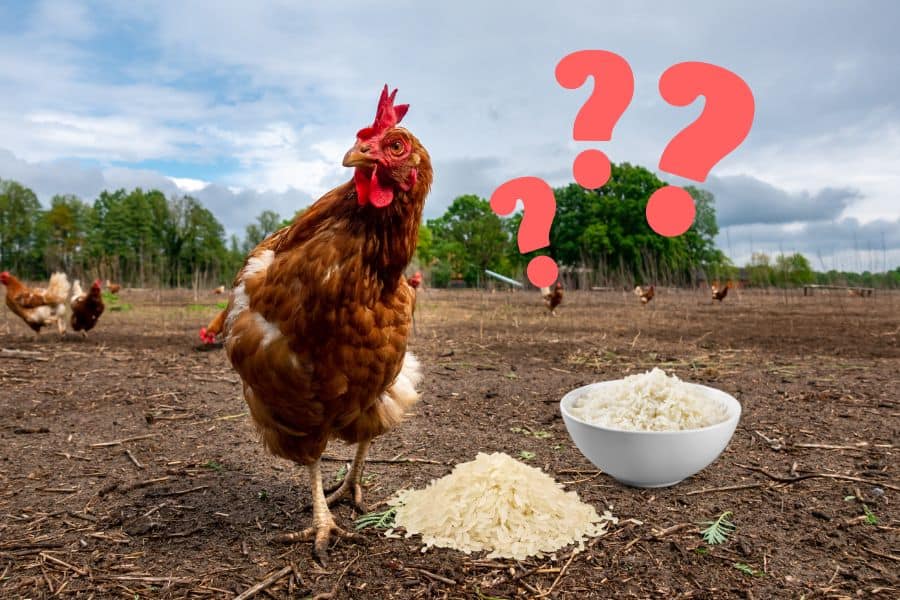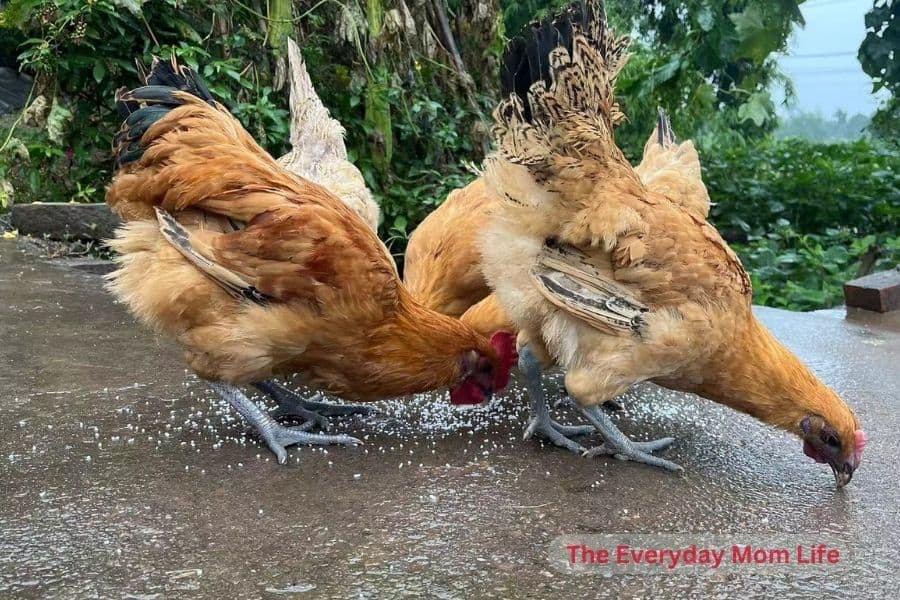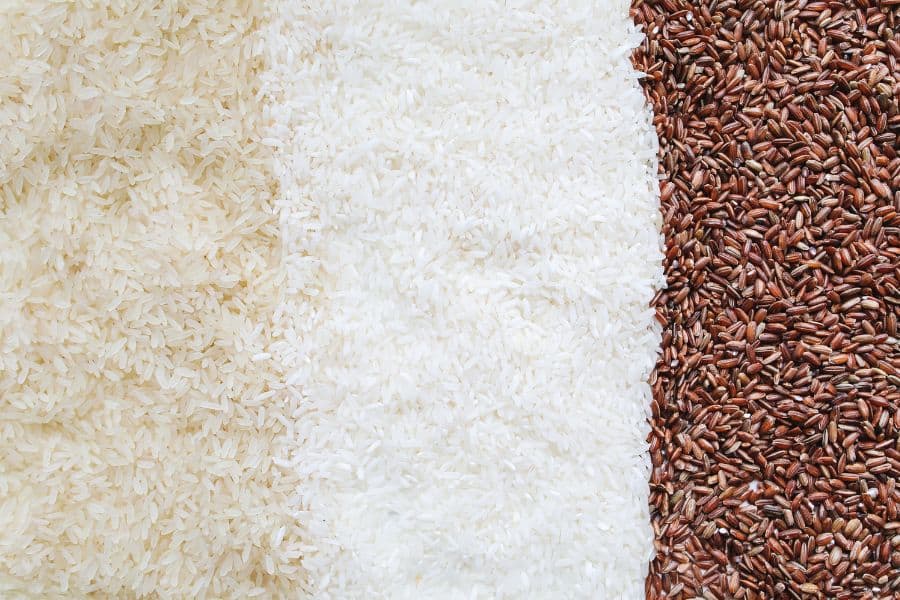Chickens are omnivorous birds, meaning they can eat a whole array of foods.
That includes both plant and animal-based foods. In short, they will eat almost anything that their little beaks can handle.
In the wild, feral chickens feed on insects, worms, small animals, seeds, fruits, and other vegetation.
When in captivity, chickens are usually fed a commercial feed tailored to meet their nutritional needs. Indeed this engineered commercial feed is a balanced and healthy option for chickens.
Chicken owners feed the chickens farmed worms and maggots or even give them scraps of raw meat. They also like to supplement their chickens’ diets with other foods that include some good protein sources.

Did you know rice is a common ingredient in many commercial chicken feeds? It provides the chickens with carbohydrates and many other essential nutrients. Rice is also one of the chickens’ favorite treats.
In this article, we are going to explore the options you have to use rice as a food source for your chickens.
Is Rice Good for Chickens?
Rice is a great source of energy for chickens. It is a nutritious food that is low in fat and rich in carbohydrates, which make up 77% of the macronutrients.
As we said, rice is rich in nutrients, vitamins, and minerals such as niacin, thiamine, and magnesium. It is also a great source of vitamins B1, B2, B3, and E, potassium, and dietary fiber if it is brown rice. It is very easily digestible and helps normalize digestion.
All these are very important for your chickens’ health. While rice is a good food source for chickens, it definitely should not be your chickens’ only source of food.
When included in the chicken diet, rice can have many benefits. Let’s see what these benefits are.
Rice Improves Chickens’ Digestive, Cardiovascular, and Nervous Systems
Vitamin B1 or Thiamine deficiency causes appetite loss, tremors, and walking problems. Providing your chickens with sufficient quantities of vitamin B1 will make them grow strong.
Rice contains abundant Vitamin B1, which is essential for the cardiovascular, nervous, and digestive systems to function properly.
Another vital nutrient found in rice that plays an essential role in nervous and digestive system functioning is Vitamin B3 or Niacin. The lack of it can cause metabolic disorders, dermatosis, bowed legs, and feathering problems.
Rice Enhances Bone Formation
In order to develop strong bones, chickens need magnesium. They don’t often get sufficient amounts of it from commercial feeds.
Since it contains loads of magnesium, rice added to your chicken diet may be a good solution to this problem. Moreover, it will aid in wound healing and skin development, the eggshell formation and metabolizing carbohydrates
Rice Helps Chickens’ Brain Development
Rice is a great source of Vitamin B6 or pyridoxine, which is vital for your chickens’ proper brain function and development. It also helps chickens regulate their internal clock.
Additionally, breaking down essential amino acids present in rice pyridoxine makes rice highly digestible and bioavailable.
Rice Boosts Egg Production
If your chickens are struggling to lay a decent number of eggs or their eggs lack quality, they obviously have a deficiency of selenium in their diet. Feeding your chickens with brown rice containing about 19 mcg of selenium would be a very good idea.
Rice contains this mineral that plays a vital role in enhancing semen quality, egg hatching, and production. It strengthens a chicken’s immune system, stimulates blood circulation, and helps muscle development.
It also protects chickens’ bodies from radicals. Backyard chickens can find selenium in the soil and the plants around your home, but indoor chickens need to be provided with it in their everyday diet.
Can Chickens Eat Cooked Rice?
Yes! Chickens simply love it! It probably reminds them of maggots since they eat it fast! Feeding chickens cooked rice is much better than giving them raw rice since they have more benefits, like easy digestion when fed cooked rice.
Remember, rice has just 4,4% protein, and it is excellent only as a treat, not as a replacement for a diverse diet chicken should have. So it can be given once a day as a mix of 1 part of cooked grains and 3 parts of other food.
Can Chickens Eat Uncooked Rice?
Yes! Chicken evolved by eating raw grains, so their digestion system allows them to break down raw rice. They can eat uncooked rice safely the same way they eat it when it is cooked.
Moreover, uncooked rice is much better since cooking displaces some of its essential minerals and nutrients.
If you decide to feed your chickens some uncooked rice, make sure to keep it to a small amount, not more than 20% of the weight of your chickens’ diet. Also, ensure that chickens have access to a lot of fresh and clean water when fed uncooked rice.
Can Chickens Eat Dry Rice?
Chickens can eat dry rice safely! It is a high-carb instant energy source necessary that supports chickens’ active lifestyles. But again, it should be combined with high-protein sources and other required dietary elements to prevent dietary imbalance.
Feeding your chickens a lot of dry rice is not only somewhat harmful to their health, but also they are unlikely to eat it. You see, chickens prefer foods with a high moisture content.
You could feed your chickens with dry rice if you rinse it or let it absorb some water first. This will make your chickens’ rice easier to digest, and they are much more likely to eat it.
But as a quick snack, it is acceptable. If you have nothing else at hand, just give them a small amount.
Can Chickens Eat White Rice?
White rice is a relatively healthy treat for your chickens, but it contains fewer nutrients because its healthier parts, such as fiber, are removed during processing. It’s a good option for young chickens with digestive problems.
Although it may not provide as many nutrients as brown rice, it is still a good and healthy addition to your chickens’ diet, and it should not be the only food source for your chickens.
Remember, you should under no circumstance add any salt and oil to the rice whatsoever. Chickens are very sensitive to an imbalance of electrolytes and can actually die from it.
Additional oils in their diet that don’t come from their food can also cause problems.
Can Chickens Eat Brown Rice?
Brown rice stands out for its composition because the most valuable nutrients are hidden in the husk. It is an excellent choice for chickens’ regular feed.
Since it is minimally processed, it is more nutritionally valuable, contains more protein and fat, therefore more calories, fiber, and finally, more minerals and B complex vitamins than white rice. It is very digestible and helps normalize digestion. All this helps chickens to grow up big, strong, and healthy.
Can Baby Chicks Eat Rice?
Yes, baby chickens can eat rice. However, you should be aware of a few things. First of all, rice can only be regarded as a supplement to other types of foods. It alone can’t provide enough of the nutrients they need.
For baby chicks to grow properly and develop into healthy grown chickens, they need a high-protein diet. When used in moderation, rice can be a healthy and delicious addition to a baby chicken’s feed.
Remember that brown or wild rice is generally better than white rice since it contains more vitamins and minerals. And finally, when you serve rice to your baby chicks, soften it by cooking. It will make it easier for them to digest.
How To Feed Rice to Chickens?
It is important to understand how to feed rice to your chickens. There is a safe way to do it and in moderation, as there can be some downsides. Following these tips and guidelines will help you incorporate rice into the diet of your chickens in a safe manner:
- While choosing among different types, make sure to choose the healthiest ones to ensure your chickens get the most nutrients from the rice.
- Although rice is rich in nutrients, vitamins, and minerals, which are all very important for your chickens’ health, the rice should definitely not be the only food source for your chickens.
- Be sure to offer a variety of other foods as well, such as vegetables, fruits, and meat. You can mix it with other grains and some vegetable leftovers or cooking scraps such as onion peels. This will help ensure your chickens get all the nutrients to remain healthy.
- Make sure the food scraps aren’t something that is toxic or harmful to the chickens. Do your own research before feeding them your kitchen scraps and table leftovers.
- Avoid adding any seasonings or other unnecessary ingredients.
- While rice is a healthy food source, like with everything, there can be too much of a good thing. Too much rice can lead to rapid weight gain and other health complications. In certain varieties, too much rice will cause organ or even leg failure. This is because of the fast weight gain, which results in death.
- Chickens really like rice, especially in the form of porridge diluted with milk. Such porridge perfectly saturates and enriches the body with all necessary vitamins and microelements. Important! An excess of rice in the diet can cause paralysis or even death in the entire chicken population. To prepare tasty and healthy food, you can use unpolished rice, chopped rice, and rice flour, which are also added to wet feed mixtures.
- Never let treats of any kind, including rice, exceed 10% of your chickens’ caloric intake. This means that a cup of rice every 3-4 days is perfectly safe, but you should avoid daily rice-based treats. Your chickens may become addicted to the treats and refuse to eat their regular feed.
Related:
Conclusion
In conclusion, chickens can and should eat rice. As an excellent source of carbs and other essential nutrients, it offers multiple benefits to your chickens.
But, it should not be the only food source for chickens because of their nutritional needs. Therefore, feed it in moderate amounts to give your feathered friends the necessary nutritional bust.


